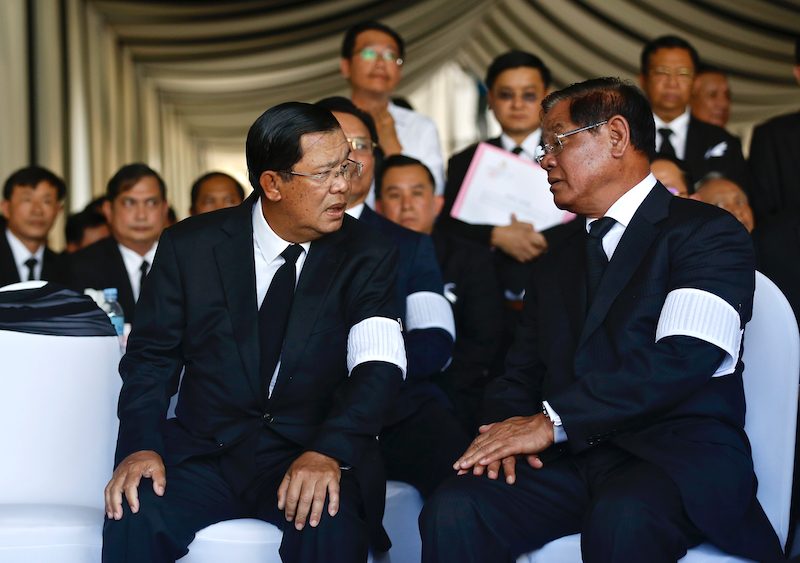Reversing the course of “continuity” laid out by a government spokesman this week, Prime Minister Hun Sen on Wednesday declared that the sprawling portfolio of Deputy Prime Minister Sok An would be spread among ministries.
Deputy Prime Minister Bin Chhin, who like Sok An has long been one of Mr. Hun Sen’s most trusted technocrats and negotiators, was appointed to replace Sok An as head of the Council of Ministers on March 16, the day after his predecessor died in China.

On Tuesday, Council of Ministers spokesman Phay Siphan said that Mr. Chhin, 67, would also head various other agencies that had been under the control of Sok An, such as the Apsara Authority, the government’s task force for the Khmer Rouge tribunal, the Scouts and the Royal Academy of Cambodia.
Mr. Hun Sen chided Mr. Siphan during his speech on Wednesday in front of a graduating class of teachers at the National Institute of Education in Phnom Penh and announced that most of the state institutions would in fact be divvied out to relevant ministries, along with the budget for those bodies, which previously went to the Council of Ministers.
“I regret that High Excellency Phay Siphan did this work,” the prime minister said, referring to interviews with various media outlets in which the spokesman said Sok An’s entire portfolio would be given to Mr. Chhin.
“Sometimes the reporter is not wrong, but we have provided the wrong information,” he said. (The Cambodia Daily published a front-page story on Tuesday about the transfer of power to Mr. Chhin based on an interview with Mr. Siphan.)
“I have already told spokesmen, reporters and commentators not to pretend that you know everything,” he added.
Mr. Hun Sen said that Mr. Siphan, also a secretary of state at the Council of Ministers, had jumped the gun by announcing decisions that had not been settled on by his superiors.
“The boss had not yet decided, but it was released,” he said, adding that Mr. Siphan would not be disciplined but needed to take the prime minister’s speech as medicine to prevent future missteps.
“Now cure your craziness with this injection,” he said.
Upon completing his scolding, Mr. Hun Sen laid out how Sok An’s various posts would be shared among ministries.
Both the Apsara Authority, which oversees the Angkor Archaeological Park, and the authority overseeing the Preah Vihear temple—another of the country’s most prized tourist attractions—will be overseen by Phoeung Sakona in her capacity as the Culture Minister. She will also take Sok An’s position as head of the National Commission for Unesco.
The National Association of Cambodian Scouts, a youth group widely seen as a recruitment arm for the ruling party, will move under the purview of Education Minister Hang Chuon Naron. The country’s railway committee will now be controlled by the transport minister, Sun Chanthol, while the engineering council will be moved to the Labor Ministry.
Mr. Chhin will take on Sok An’s position as the government’s point man for the Khmer Rouge tribunal, a tricky position that requires maintaining sensitive relations with the U.N., which controls the international side of the court and would like to see government-opposed cases move ahead.
He will also take on the largely honorary position of president of the Royal Academy of Cambodia, ostensibly the state’s bastion of higher-level scholarship and research, and oversee the State Secretariat of Civil Aviation.
Much of Sok An’s portfolio, most notably the Cambodian National Petroleum Authority, had already been shifted from his direct control to the ministry most capable of absorbing the body—in the case of the petroleum agency, the Mines and Energy Ministry. More than a dozen state bodies were moved from Sok An’s control in 2013, after the ruling party was shaken by a narrow victory in the national election, in what many saw as a move to spread wealth within the ruling party.
Mr. Siphan said at that time and again on Wednesday that Sok An wielded such broad control as a matter of necessity because many ministries previously lacked the capacity to control important state bodies, a situation that he said had changed over the years.
“At that time, we needed that,” he said on Wednesday, explaining why Sok An, the prime minister’s top lieutenant, took on so many jobs. “This time, the ministries have enough ability to deal with that themselves.”
Regarding his dressing-down by the prime minister, Mr. Siphan said he was not embarrassed, but rather grateful for the advice.
“I respect his leadership. I feel thankful to him,” the spokesman said, adding that he had actually intended to inform media outlets that Mr. Chhin would temporarily take on Sok An’s portfolio while Mr. Hun Sen decided on a long-term plan.
Mr. Hun Sen “has the sovereignty to delegate responsibility to any institution,” Mr. Siphan said. “This is decentralization.”